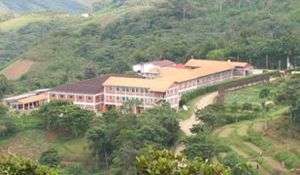Unidad Académica Campesina-Carmen Pampa
The Unidad Académica Campesina-Carmen Pampa (UAC-Carmen Pampa) is a satellite campus of the Catholic University of Bolivia founded in 1993 to serve the rural poor of Bolivia.[1] It is located in Carmen Pampa, a small farming community 12 km. from the town of Coroico.
 Upper campus of the UAC-Carmen Pampa (Campus Leahy) | |
| Motto | Apredizaje es Metanoia |
|---|---|
Motto in English | Learning is metanoia |
| Established | 1993 |
| Affiliation | Catholic University of Bolivia |
| President | Msgr. Juan Vargas Aruquipa (Bishop of Coroico) |
| Director | Jose Luis Beltran |
| Academic Director | José Luis Mamani Quispe |
Academic staff | 5 |
Administrative staff | 30 |
| Students | 727 (2018) |
| Location | , , 16.25825°S 67.69175°W |
| Campus | Rural |
| Colours | Blue and Gold |
| Website | www |
History
The UAC-Carmen Pampa was founded on October 3, 1993, by Sister Damon Nolan,[1][2] a nun of the Missionary Franciscan Sisters of the Immaculate Conception of the Third Order of Saint Francis. It started as part of a consortium of rural campuses of the Catholic University of Bolivia called UACs (Unidades Académicas Campesinas), created to educate the rural poor, and in 2010 became an independent satellite campus of the Catholic University of Bolivia.[3] The university first offered technical degrees in agronomy, veterinary/animal science and nursing. In 1998 the UAC-Carmen Pampa augmented its offering to a licenciatura (BS-equivalent). In 2003 the UAC-Carmen Pampa began offering a licenciatura degree in primary education. In 2006 the UAC-Carmen Pampa started a technical degree in ecotourism, which became a licenciatura degree offering in 2013. The UAC-Carmen Pampa also offers a remedial one semester program of college preparatory classes called pre-university.[4]
In 1999, the Carmen Pampa Fund was established to provide support for the UAC-Carmen Pampa. It is located in St. Paul, Minnesota.[5][6] The UAC-Carmen Pampa also received significant support from USAID since 2001 [7] until USAID's expulsion from Bolivia in 2013.[8]
In 2003, the United Nations recognized the UAC-Carmen Pampa as an institution with "best practices in poverty eradication." [9] The UAC-Carmen Pampa has also been recognized for its efforts toward ending poverty and increasing profitability and food sovereignty for rural people,[10][11] and its graduates accomplishing the same.[12][13] In May 2011, the education and health committee of the Legislative Assembly of Bolivia recognized each of the UACs as an Institución Meritoria del Estado (Meritorious Institution of the State) for their work in higher education.[14] The UAC-Carmen Pampa has also been recognized by the Center for Education Innovations.[15]
Mission
The mission of the UAC-Carmen Pampa is make higher education available to young people of rural areas and those who are, for whatever reason, are unable to pursue such studies; prepare men and women who, inspired by principals of Christian vocation, are called to the service of others, with a high quality professional training and a commitment to Christian principals to guide their decisions; be in constant search for truth and goodness by way of learning/apprenticeship, research, and community extension; develop extension programs through specific projects that meet the needs felt in our communities; and integrate the successes of the university community into the countryside, strengthening and developing progress and socio-economic liberation, through academic, research and extension activities.[16]
References
- Carmen Pampa Fund. n.d. History and Mission of the College. Available at http://carmenpampafund.org/uac_history.htm. Accessed 2010-08-17.
- Berggren, K. 2003. A school for life in Bolivia. National Catholic Reporter Oct. 17, 2003. Available at http://natcath.org/NCR_Online/archives2/2003d/101703/101703p.htm. Accessed 2010-07-15. (Archived by WebCite at https://www.webcitation.org/5rFvvnsje)
- UAC-Carmen Pampa. n.d. Reseña histórica. Available at http://www.uac-cp.edu.bo/universidad/rese%F1a.asp. Accessed 2010-08-17. (in Spanish)
- Enders, J. 2010. Educating indigenous students. Global Post July 15, 2010. Available at http://www.globalpost.com/dispatch/education/100713/indigenous-bolivia?page=0,0. Accessed 2010-07-15. (Archived by WebCite at https://www.webcitation.org/5rFyW9bUi)
- College of St. Catherine. 2009. The Carmen Pampa Fund. Available at http://library.stkate.edu/carmenpampa/fund.html. Accessed: 2010-08-17.
- Hopfensperger, J. 2016. A Minnesota-funded college has taken root in rural Bolivia. Minneapolis Star Tribune Feb. 16, 2016. Available at http://www.startribune.com/a-minnesota-funded-college-has-taken-root-in-rural-bolivia/369044651/. Accessed 2016-02-26.
- USAID. 2013. Bolivian scholarship students solve community problem. Case Study. Available at http://www.usaid.gov/results-data/success-stories/bolivian-scholarship-students-solve-community-problem. Accessed 2014-06-25.
- New York Times. 2013. U.S. Agency Is Expelled From Bolivia. May 1, 2013. Available at https://www.nytimes.com/2013/05/02/world/americas/bolivian-president-expels-us-aid-agency.html. Accessed 2016-02-12.
- United Nations Sub-Committee in the Eradication of Poverty of the NGO Committee for Social Development. 2003. Best Practices in Poverty Eradication: Case Studies from the Field. United Nations. Available at http://www.ngocongo.org/congo/files/report.pdf. Accessed: 2010-06-25. (Archived by WebCite at https://www.webcitation.org/5qko1GtTz)
- Cahill, S. 2010. More Than They Can Chew. Different Voices (Radio Program/Newstalk Ireland) July 17, 2010. Available at http://media.newstalk.ie/newstalk/media_uploads/upload_mp3/144702269More_Than_They_Can_Chew__podcast.mp3. Accessed 2010-08-18.
- Kjelberg, C. C. 2008. It takes a village (Radio Program/Minnesota) October 11, 2008. Available at http://www.villagetalkradio.com/listen.html. Accessed 2010-08-18.
- Satterlee, R. 2012. Story of a Rural Bolivian University. Global South Development Magazine. November 7, 2012. Available at http://www.gsdmagazine.org/story-of-a-rural-bolivian-university/. Accessed 2016-03-11.
- Satterlee, R. 2013. The Universidad Académica Campesina–Carmen Pampa: a College for Bolivia’s Rural Population. Institute for Advances Development studies. November 14, 2013. Available at http://inesad.edu.bo/developmentroast/2013/11/the-universidad-academica-campesina-carmen-pampa-a-college-for-bolivias-rural-population/. Accessed 2016-03-11.
- INFODECOM. 2011. Gobierno reconoce labor educativa de las Unidades Académicas Campesinas de la Universidad Católica. Available at http://www.infodecom.com/Manager.php?var=15432. Accessed 2011-05-11. (in Spanish)
- Center for Education Innovations. 2016. Unidad Academica Campesina-Carmen Pampa. Available at http://www.educationinnovations.org/program/unidad-academica-campesina-carmen-pampa. Accessed 2017-04-24.
- UAC-Carmen Pampa. n.d. Visión, Misión, Valores. Available at http://www.uac-cp.edu.bo/universidad/vision.asp. Accessed 2010-08-17. (in Spanish)
External links
- UAC-Carmen Pampa (in Spanish)
- Carmen Pampa Fund
- Catholic University of Bolivia (in Spanish)